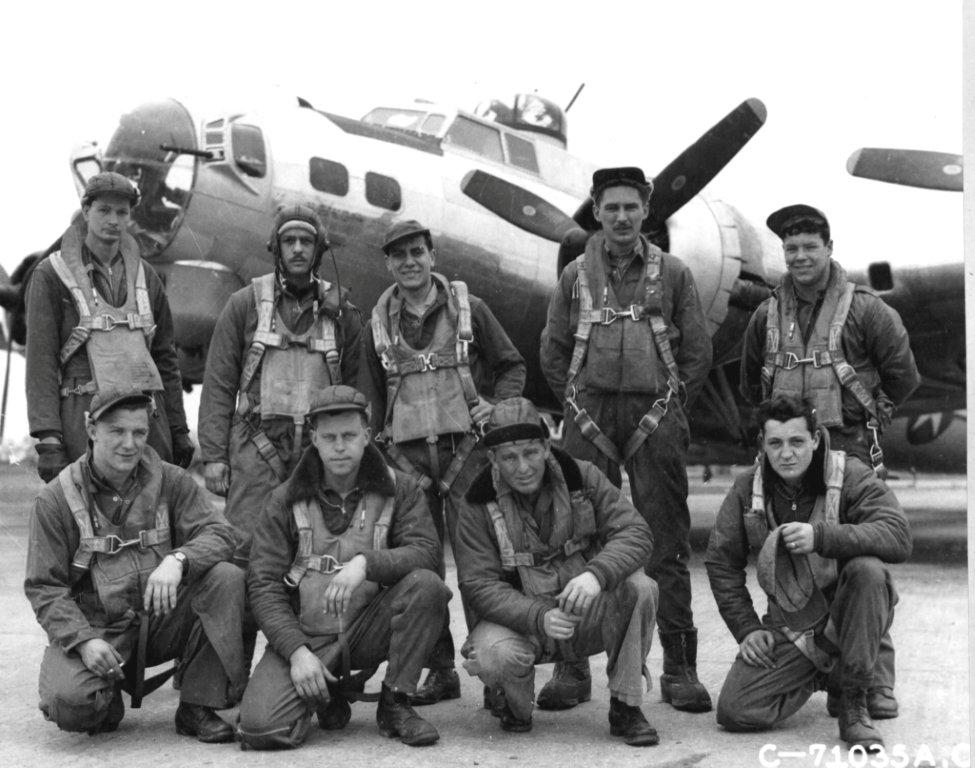|
|
WAR STORIES:
THE BIRMINGHAM JEWELL by Alvin J. Anderson

On April 19, 1944 our crew was assigned to a new B-17G,
aircraft no. 4297678. Our pilot, 2nd Lt. Walter W. Smith,
named and painted the name on the nose. He named it after
his wife, Jewell, and hometown Birmingham, Alabama. So from
then on it was known as the Birmingham Jewell. It was my
fifteenth mission. The crew included Lt. Smith, Pilot; 2nd
Lt. Ralph J. Brocato, Copilot; 2nd Lt. Raymond W. Connor,
Bombardier; T/Sgt. Joseph Diorio, Nose Gunner; S/Sgt. Alvin
J. Anderson, Flight Engineer/Top Turret Gunner; S/Sgt.
Oval
Greenmyer,
Radio Operator/Gunner; S/Sgt. John J. Bodnar,
Ball Turret Gunner; S/Sgt. John J. Falbo, Right Waist
Gunner; S/Sgt. Leonard W. Leedy, Left Waist Gunner; S/Sgt.
Joseph L. Prevost, Tail Gunner. The target that day was
Kassel/Waldau and Eschwege, Germany to bomb aircraft
assembly plants. My thirtieth and last mission that I flew
in The Jewell was on June 10, 1944, to Vannes, France to
bomb an air-drome.
The Jewell was a great B-17. It was an easy plane to fly and
very dependable. She flew her one-hundredth mission on
November 10th, 1944. The target was an airdrome at Ostheim,
Germany. On February 3, 1945 she flew her one hundred and
twenty-eighth mission, which was her last. The target was
railroad marshalling yards near Berlin. Upon losing an
engine near Berlin the plane had to drop out of formation
and try to get back to England on its own. Three German
ME-109s shot her down. Four of the nine crew members were
killed.
At this time The Jewell had flown more missions than any
other B-17 in the Eighth Air Force. Later there were others
that surpassed this number. Aboard the ill-fated plane were
1st. Lt. William A. Webber, Pilot, KIA; 2nd Lt. James T.
Kiester, Copilot, MIA; 2nd Lt. Thomas A. Pickett, Navigator,
POW; S/Sgt. Raymond Wetherbee, Nose Gunner, KIA; T/Sgt. Carl
E. McHenry, Radio Operator/Gunner, KIA; T/Sgt. Harold F.
Francis, Flight Engineer/Top Turret Gunner, MIA; S/Sgt.
William T. Walls, Ball Turret Gunner, KIA; S/Sgt. William W.
Scarffe, Waist Gunner, POW; Sgt. Bennett D. Howell, Tail
Gunner, POW.
****
The 379th BG (H) B-17G, OL' GAPPY, assigned to the 524th
Squadron is credited with flying 157 combat missions, more
than any other heavy bomber in the 8th Air Force. Historian
Roger Freeman reports it in the book, THE MIGHTY EIGHTH.
 A
GALLANT TRY A
GALLANT TRY
To make an understatement, the success of the "career" of
the B-17s flying combat was dependent on the ground crews
and specialists who maintained them. This included crew
chiefs and the men who worked on them on the flight line.
Then there were specialists who were assigned to the service
squadron or service group and worked in the shops. Major
repairs were made there on badly shot-up fuselages, wings
and tail assemblies; engines were overhauled; instruments,
radios, propellers were refurbished, to name some of the
specialty work done by ground personnel to "Keep 'em
flying!"
Whatever happened to the Beautiful Birds over enemy
territory where the lurking Luftwaffe roamed and pockets of
flak cluttered the blue sky, both potentially dangerous, was
beyond the control of the dedicated ground personnel whose
work on the Flying Fortresses enabled them to soar into "The
Wild Blue Yonder."
|